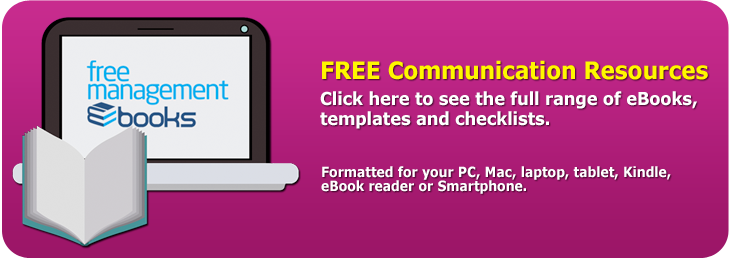Communication Skills - Everyday Management Presentations
Most books about giving presentations have been written by people who make their living from teaching high-impact presentation skills. High-impact presentations are those that are designed to 'sell' something to the audience. They include sales presentations, those that need to convince the audience to accept a big change of some sort, and those designed to entertain the audience, like an after dinner speech. These books tend to make certain assumptions. For example:
• Any worthwhile presentation needs to have a 'wow' factor
• You always have enough time to prepare an unforgettable presentation
• Your audience needs to be entertained
These assumptions may be valid for high-impact presentations but they don't apply to most management presentations because:
• You will usually be presenting information rather than a 'vision'
• Quite often you won't be able to justify much time to prepare
• Your audience wants you to be brief, so they can get back to work
Whilst it is true that you may occasionally have to make a high-impact presentation, most of the time the information you are presenting will be fairly low key, and you will struggle to find the time to prepare and practice in your already busy schedule.
This means that you need a quick and easy method of structuring information so that you can present it in a way that gets your key message across as efficiently as possible.
 |
It is important to note that when we talk about a low-key presentation it does not mean that the information is unimportant or that you don't need to prepare properly. A low-key presentation is simply one where you need to inform others or keep them up to date on an issue or project. You may use it as an opportunity to boost team morale, or make a recommendation to senior management, but you are not 'selling a vision,' trying to change people's attitudes in some major way, or trying to entertain them.
Nonetheless, these low-key presentations are important because you are visible to your own team or to your senior management, both of which are important to your career because:
1) A motivated team who will go the extra mile for you will enable you to achieve more.
2) Being seen as a dependable performer in front of an audience can help your promotion prospects.
Remember, when it comes to presentations about the benefits of a recently completed project or a new process, people tend to assign disproportionate credit for the work to the individual who makes the presentation, even if that person is presenting on behalf of a team. In fact, the stronger the presenter the more credit the audience assigns to him or her. This is not exactly fair but it is another good reason for becoming an accomplished presenter if you want to get on.
You may also be interested in:
Planning a Management Presentation | Advantages and Disadvantages of Presentations | Four-Stage Presentation Planning Process | Audience Profiling | Presentation Environment | Define Your Key Message Statement | Outline the Scope of Your Presentation | Management Presentation Planning Guidelines.



